from Instagram

Incredible flyer designed by @rat_maf
Saturday, October 11 at 3pm
Wooden Shoe Books
from O.R.C.A.
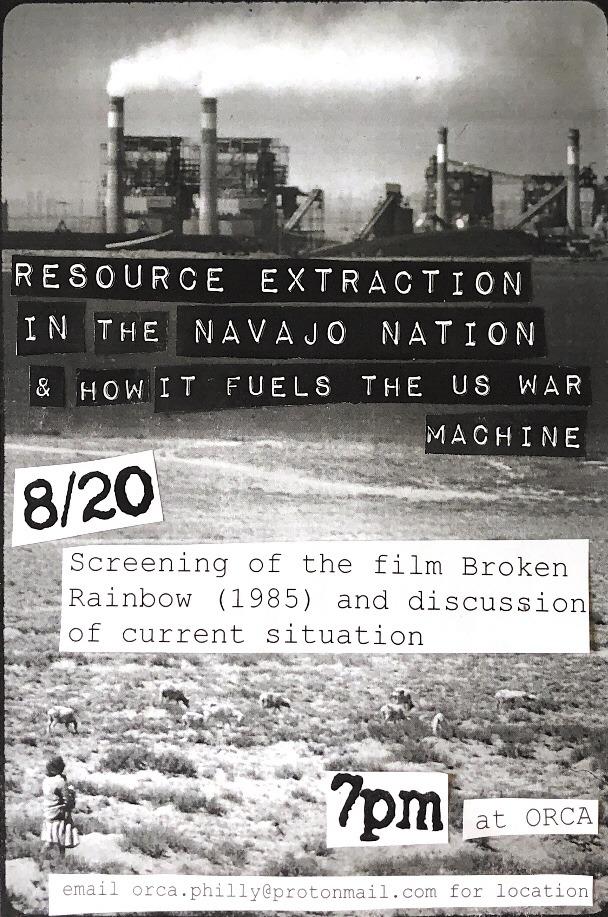
During open hours August 20th, we will screen the 1985 documentary “Broken Rainbow.” This movie explains some of the historical context that allows coal and uranium mining on native land in the southwest.
We will also be discussion updates on the new uranium boom as the Trump administration and big tech, pucsh to develop domestic sources of uranium for energy and “defense.”
Animus, animut, animul, animis, amirus…
PDF
Reading Imposed PDF
Printing Imposed PDF (Letter, optional color on imposed pages 167 & 171 – we did b&w this edition)
Covers & Spine for Printing (8.5×12”, color)
Inner Cover Blurb for Printing
Paperback, ~ 5.5″ x 8.5″ x 1.15″, 446 pages
Limited amount of physical copies available, email reekingthickets@proton.me to check availability and get yours – $5 (just to cover part of the cost of materials) plus shipping if not local (book weighs ~2lb). Intended for spreading learning and as reappraisal/theoretical collage, not profit. If you’re a reading group or bookstore, infoshop, author, think you can get it into a prison, etc., inquire about possibly reduced cost or free books! A first foray into small-scale bookmaking, this initial edition is unfortunately quite rough, with some edges trimmed on a slant, too-small margins (they’ve since been increased in the printing PDF), some occasional slightly faded text or misprints not significantly preventing legibility, a too stiff cover, and the possibility of some toner rubbing off over time.
Authorization for included authors’ work (credited, mainly excerpted, with some labeled editorial comments) not sought. Anti-copyright for editor’s contributions (including an introduction, compiled timeline of the anarchist propaganda of the deed era, a very brief overview of the Bonnot gang’s activities and international illegalist dispersions of that period, a historical outline of the origins of contemporary insurrectionary anarchism focusing on Italy and a timeline of some contemporary insurrectionary attacks, and a preface to two of the included sections on gender in historical Lenape/Delaware and colonial contexts) – if you want to print, bind, or distribute it yourself, I have no objection!
Despite the brief included section on an attack on a vaccination centre, this is not intended as a conspiracist ‘anti-vax’ or COVID-denialist collection or as support for those positions. The section itself does demonstrate a nuance and independence of thought and position too rare on this and other topics in our millieus, and contains important general reflections on the system’s scapegoating of responsibility and coerced dependence on its ‘solutions’ which are tied into the causes of the problems in the first place. That said, another primary reason for the piece’s inclusion is that in this attack and claim’s context it seems to the editor like a strong cautionary example of a counter-productive action locked into an over-symbolized, alienated frame of resistance and determined by a mechanical, quasi-moralist logic – an endemic kind of pitfall insightfully analyzed in the included ISIW and Tom Nomad sections among others.
This collection brings together mostly already-published, excerpted writings by other authors in anarchy (anti-civilization, queer, insurrectionary, illegalist, and nihilist) and anthropology of the indigenous peoples of Amazonia, the North American Eastern Woodlands, Siberia, and Oceania (in the currents around ‘new animism’, Amerindian perspectivism, the so-called ontological turn, and on egalitarian ‘societies against the state’ and the relationships with these and with hierarchy/civilization of gender, magic, ontology, and violence – also as it concerns animals or spirits, predation, on ‘supernatural’ planes, or as a quality or possibility), some history, and a few studies of insurgent strategy. In addition, there are recurring focuses on the origins and concealed qualities of state-like forms, the paradoxes of semiosis as both civilized and anti-civilized, and the complication of relations between ‘opposites’ beyond a simplified dualism or nondualism. Animus is a chaotic, naive attempt at collection and distribution emerging from a historical and personal period spent both adrift and under torque. It’s intended as a broad and efficient introduction to the depths of some particularly incisive or relevant approaches in anarchy and anthropology (the specific varieties share some important influences and perspectives, yet differ on others and appear quite compartmentalized), catalyzing as much magico-insurrectionary rupture and insight as possible, for those both well-versed or unfamiliar. A compulsive, propulsive effort (neither the fruit of this book’s editor or, in its triangulated particularity, that of the authors either) to weave a fabric that might unravel a few of the threads making up our worlds; those instituted as well as those counter-posed.
Though queerness is a main focus throughout, only a relatively small portion of the material directly focuses on explicitly queer sexuality, gender, or experiences as conventionally understood. Instead, it’s queer in the sense that the collection is grounded in and meant to inform and sharpen our lived, mutual relation of hostility with the core structures of gender, sexuality, group and individual identity, morality, sociopolitical organization, semiosis, and indeed ontology/cosmology/metaphysics that underpin civilization’s power.
In engaging with the ‘anthropological’, we aim to use the means provisionally designated under this broadly understood, nebulous field against itself, as its best practitioners (opponents?) often seem to do. This indeed can characterize the approach of both its best from a redemptive reapplication of the practice of trying to better understand, complicate, perceive, relate to, or encounter people and the social and of those from its sinister colonial locus. In both – a differing of mentation and a mentation of the different. We find that two impulses of these kinds often impersonate or appropriate each other but genuinely have radically different, opposing trajectories. Many of the authors seem to imply that stratified institutions, civilized sexual, gender, and ethno-racial regimes, nationalism and oppressive xenophobia, the alienating order of language, and quasi-Cartesian humanism may have emerged or cloaked themselves under the necessarily possible inversion of forms created specifically for their prevention, and continue to be partly powered by these functions persisting in them as a residue, as well as potentially subverted by them. These egalitarian forms still extant in indigenous ‘societies against the state’ include the chiefs whose structural power (not properly their own) exists in them being prevented by everyone else from exercising hierarchy. Localized kinship bands whose version of unity exists to violently ensure broader dis-unity. The many indigenous origin myths of how all beings were once human, unlike the civilized myths of animal descent. Humanity as a bodily (yet agent-ed and not scientifically biological or materialist) way of creating one’s self common to all beings (but only through each kind of being’s view) and resting, always unstably, on the capacity to appropriate other kinds of beings’ hostile, animal otherness through a play of mimetic-empathic, mutually defining, metamorphic, violent contact, without getting lost and oneself becoming appropriated into the ‘humanity’ of the others. A threatening yet all-sustaining given of potential sociality and culture (one conflictual and egalitarian) common throughout the cosmos.
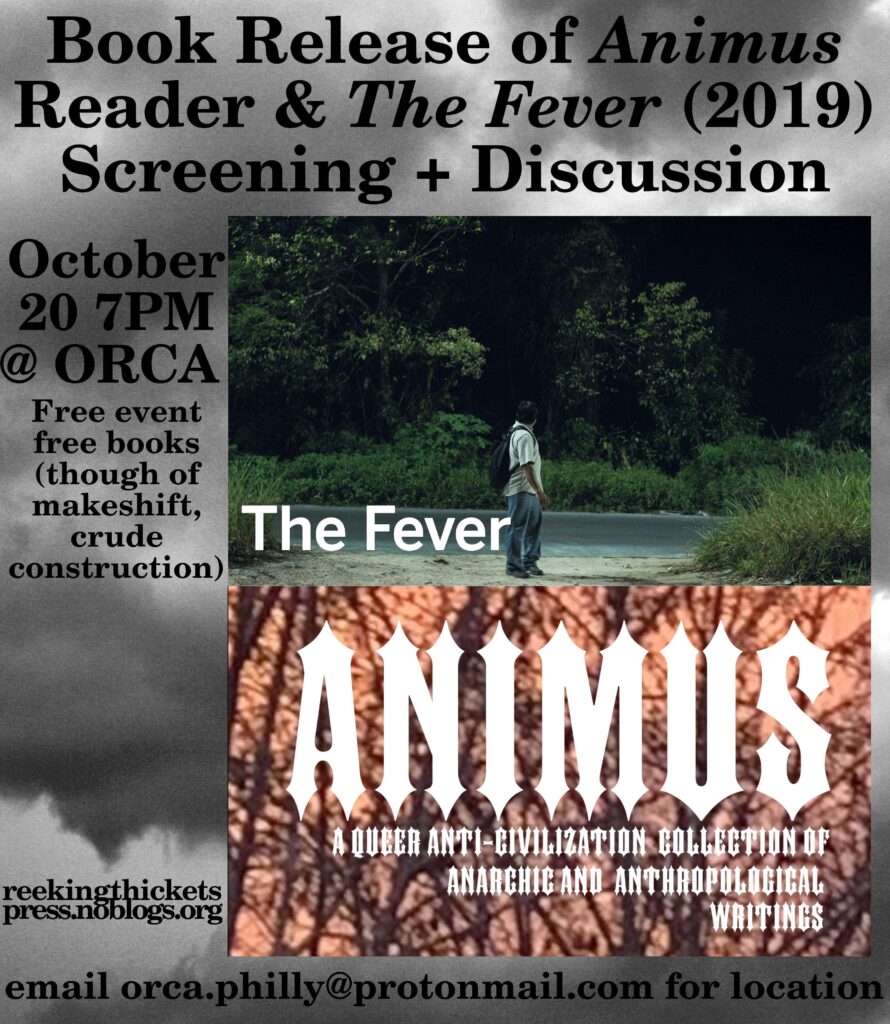
Animus, animut, animul, animis, amirus…
Join us at ORCA (email orca.philly@protonmail.com for the location) on October 20th at 7pm for a free event for the release of Animus. Free copies (crudely bound+limited availability, reading and printing pdf’s will be free online after the event, and physical copies will be $5 after to cover some of the cost of materials, plus shipping) will be available and if you feel like hanging around we’ll be watching The Fever (2019, 98 min., by Maya Da-Rin) and having a short discussion. Masks will be available and are encouraged. If you’d like to throw cash to future publishing efforts or ORCA there will also be options for that, though not expected at all. If you have stickers, zines, etc. you’d like to give out feel free as well! You can read a pdf of the introduction here.
A first foray into small-scale bookmaking, this initial edition is unfortunately quite rough, with some edges trimmed on a slant, too-small margins, some occasional slightly faded text or misprints not significantly preventing legibility, a too-stiff cover, and the possibility of some toner rubbing off over time.
Animus is an unauthorized collection, a 446pg. paperback of mostly already-published, excerpted writings which brings together anarchist pieces (anti-civilization, queer, insurrectionary, illegalist, and nihilist) with anthropological ones on the indigenous peoples of Amazonia, the North American Eastern Woodlands, Siberia, and Oceania (in the currents around ‘new animism’, Amerindian perspectivism, the so-called ontological turn, and on egalitarian `societies against the state’ and the relationships with these and with hierarchy/civilization of gender, magic, ontology, and violence – also as it concerns animals or spirits, predation, on `supernatural’ planes, or as a quality or possibility), some history, and a few studies of insurgent strategy.
The Fever is a realist, myth-like film by Maya Da-Rin, in collaboration with an indigenous team, featuring some relevant Amazonian cosmologies explored in the book, in industry, humanity, and the wild’s mirroring clashes. From the Criterion Channel description: “This spellbinding narrative feature debut from Maya Da-Rin is an entrancing, enigmatic meditation on the material, spiritual, and dream lives of Brazil’s Indigenous people. Justino (Regis Myrupu, winner of the Best Actor prize at the Locarno Film Festival) is a forty-five-year-old member of the Desana people who works as a security guard at a cargo port in Manaus, an industrial city surrounded by the Amazon rainforest. Since the death of his wife, his main company is his youngest daughter (Rosa Peixoto), a nurse who will soon be leaving him to study medicine in Brasilia. As the days go by, Justino is overcome by a strong, unexplained fever. During the day, he fights to stay awake at work. At night, a mysterious creature follows his footsteps. Torn between the oppression of life in the city and the distance of his native village, Justino can no longer endure an existence without place.”
The book has recurring focuses on the origins and concealed qualities of state-like forms, the paradoxes of semiosis as key to both civilized and anti-civilized forms, and the complication of relations between ‘opposites’ beyond a simplified dualism or nondualism. Animus is a chaotic, naive attempt at collection and distribution emerging from a historical and personal period spent both adrift and under torque. It’s intended as a broad and efficient introduction to the depths of some particularly incisive or relevant approaches in anarchy and anthropology (the specific varieties share some important influences and perspectives, yet differ on others and appear quite compartmentalized), catalyzing as much magico-insurrectionary rupture and insight as possible, for those both well-versed or unfamiliar. A compulsive, propulsive effort (not exactly the fruit of this book’s editor or, in its triangulated particularity, that of the authors either) to weave a fabric that might unravel a few of the threads making up our worlds; those instituted as well as those counter-posed.
Original contributions include an introduction, compiled timeline of the anarchist propaganda of the deed era, a very brief overview of the Bonnot gang’s activities and international illegalist dispersions of that period, a historical outline of the origins of contemporary insurrectionary anarchism focusing on Italy and a timeline of some contemporary insurrectionary attacks, and a preface to two of the included sections on gender in historical Lenape/Delaware and colonial contexts.
Though queerness is a main focus throughout, only a relatively small portion of the material directly focuses on explicitly queer sexuality, gender, or experiences as conventionally understood. Instead, it’s queer in the sense that it’s grounded in and meant to inform and sharpen our lived, mutual relation of hostility with the core structures of gender, sexuality, group and individual identity, morality, sociopolitical organization, semiosis, and indeed ontology, cosmology, and metaphysics that underpin civilization’s power.
In consciously engaging with the `anthropological’, we aim to use the means provisionally designated under this broadly understood, nebulous field against itself, as its best practitioners (opponents?) often seem to do. This indeed can characterize the approach of both its best from a redemptive reapplication of the practice of trying to better understand, complicate, perceive, relate to, or encounter people and the social and of those from its sinister colonial locus. In both – a differing of mentation and a mentation of the different. We find, both in the looking and what is seen, that two impulses of these kinds often impersonate or appropriate each other but genuinely have radically different, opposing trajectories. Many of the included pieces likewise seem to imply that stratified institutions, civilized sexual, gender, and ethno-racial regimes, nationalism and oppressive xenophobia, the alienating order of language, and quasi-Cartesian humanism may have emerged or cloaked themselves under the necessarily possible inversion of forms created specifically for their prevention, and continue to be partly powered by these functions persisting in them as a residue, as well as potentially subverted by them. These egalitarian forms still extant in indigenous `societies against the state’ include the chiefs whose structural power (not properly their own) exists in them being prevented by everyone else from exercising hierarchy. Localized kinship bands whose version of unity exists to violently ensure broader dis-unity. The many indigenous origin myths of how all beings were once human, unlike the civilized myths of animal descent. Humanity as a bodily (yet agent-ed and not scientifically biological or materialist) way of creating one’s self common to all beings (but only through each kind of being’s view) and resting, always unstably, on the capacity to appropriate other kinds of beings’ hostile, animal otherness through a play of mimetic-empathic, mutually defining, metamorphic, violent contact, without getting lost and oneself becoming appropriated into the `humanity’ of the others. A threatening yet all-sustaining given ground of potential sociality and culture (one conflictual and egalitarian) common throughout the cosmos.
Submission
Wolf = Humility

Indigenous Day of Rage
“We will need each other to make sure that the flames, if they were to come, clear the area that we will live in together. We will need to clear it of the fuel that would end up repeating the problems we are currently having. We will need to make sure that the seeds, nutrients and soil are scattered beyond our ability to control.” Aragorn
We don’t just want a cease fire, we want the Right of Return for all Palestinian people, for water to flow, and the traditions to stay alive. We can’t get back the countless lives lost, but we can honor and avenge them. And we will.
For the end of the struggle that is settler colonialism everywhere. Where the land is stolen, consent violated, the old ways forgotten – let it burn.
We hope that every colonizer who robs the lives and dignity of the land and the people on it understands that their great-grandchildren, and their great-grandchildren’s children are not going to be here because of their violence and indeterminent destruction.
We will still be here fighting for the next seven generations, but we will never forget the slaughter, and we will remember to make sure those grandchildren stay afraid of all that is wild.
The united states government now “recognizes” indigenous people’s day alongside columbus day. we must make this impossible to reconcile. We will remain illegible to them, and unknowable to all but each other and the stars above, the water below, and all that of the earth fighting back. We call out to the brave and the humble – all that is striving towards life, while defying management, capture, and domestication with a strength they could never know.
find the connections, funders, manufacturers, advisors, politicians, gentrifiers, and all enemies of the people and the earth. you know who they are.
find some friends and haunt those motherfuckers ghosts
from Unicorn Riot
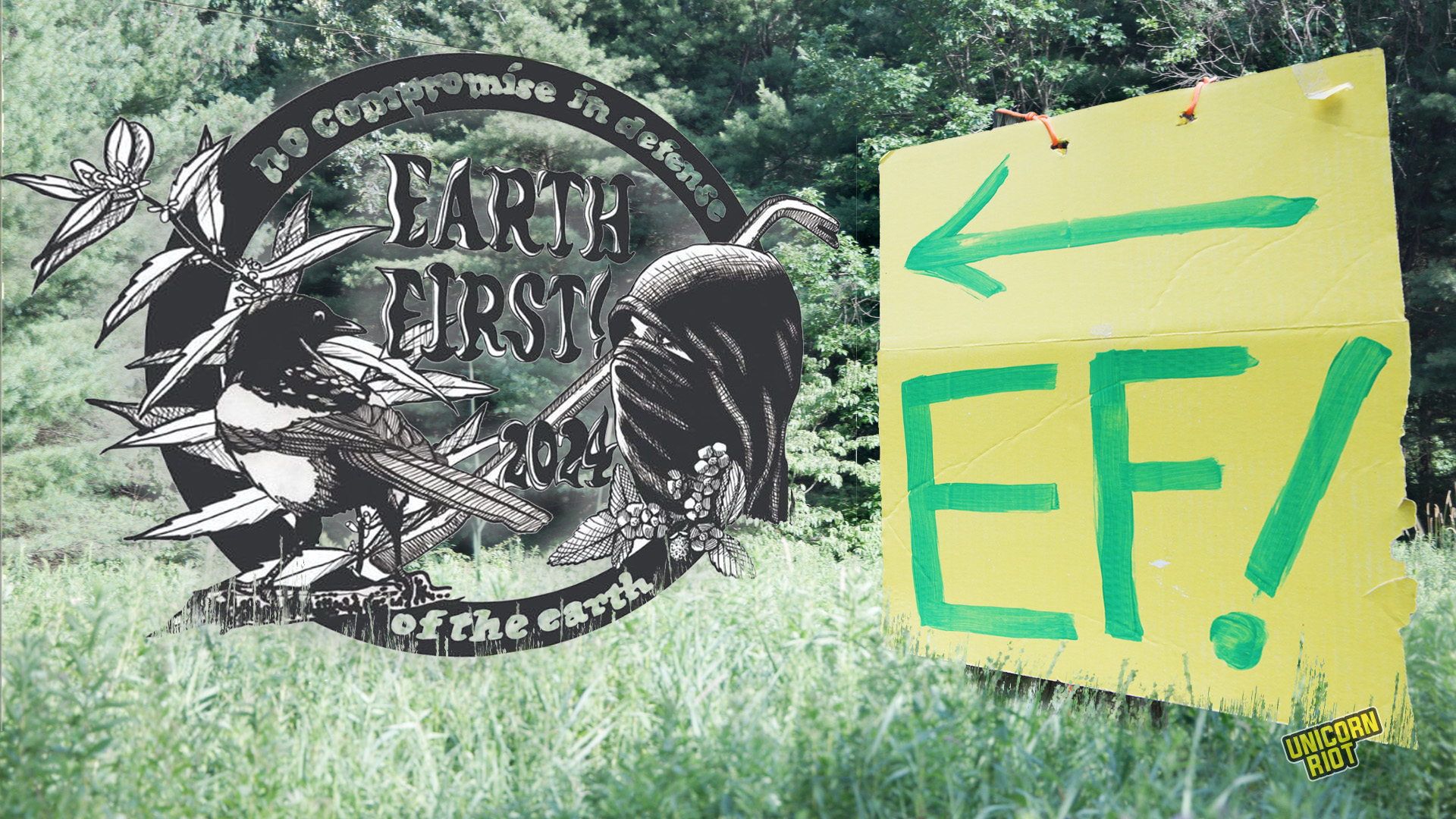
Walking up the path to the Kirkridge Retreat Center outside Bangor, Pennsylvania in early July, you may have sensed something was afoot. Cars with license plates from far-flung states lined the driveway and wild-haired twenty-somethings mingled with kids, tweens and adults in their 30s, 40s and beyond.
A hand painted cardboard sign reading simply “EF!” would have directed you, with an arrow pointing to the activity. A blend of laughter, music, and fragments of conversations about climate catastrophe quickly sets the tone before you reach a folding table strewn with literature, hand sanitizer, masks and snacks.
“Welcome,” a smiling volunteer would greet you. “Are you here for Earth First?”
This summer, around 400 people found their way to a rural plot of land in eastern Pennsylvania to participate in the national Earth First! Gathering. Over the course of seven days, anarchists, abolitionists, environmentalists and more converged on Lenapehoking, the original name for the traditional homelands of the Lenape, the region’s Indigenous people.
For over 40 years, people have gathered under the banner of Earth First!, a no-compromise, direct action movement launched to confront ecologically catastrophic industries and policies. In opposition to “big green” nonprofits, Earth First! takes a more hands-on approach to climate activism. For decades, the movement has centered direct action – the tactic of physically blocking destructive projects.
Through protests, occupations, work stoppages, locking on to equipment, and sometimes property destruction and sabotage, Earth First! seeks to do what many other organizations don’t – directly intervene and confront the companies and policies that harm ecosystems.
While the movement is focused on environmental protection as its main cause, participants see intersecting struggles as equally important. Today’s Earth First! shares heavy overlap with antifascism, Indigenous sovereignty, queer struggles and autonomous movements.
Earth First!ers don’t claim to be members of a formal structure, but rather a network of people who share, and act on, a set of principles.
“It is not an organization, but a movement,” a website representing Earth First! reads. “There are no ‘members’ of EF!, only Earth First!ers. We believe in using all of the tools in the toolbox, from grassroots and legal organizing to civil disobedience and monkeywrenching.”
Though not a formal organization, Earth First! is organized. Each year for more than four decades, Earth First!ers have hosted a national gathering where movement participants, alongside people across a wide range of social movements, meet up to share info about the struggles they’re engaged in, host workshops and trainings, and build relationships. This year was the 44th time the meetup had happened since 1979.
Throughout the week, people hosted dozens of workshops and skill shares ranging from foraging wild foods to self-defense classes. Between teaching hard skills, organizers and participants hosted conversations about fostering solidarity with Indigenous communities, movement history, mentoring future activists, and more.
To kick off a week of workshops and education, Keshia Talking Waters and her mother Maria Lawrence shared the Lenape creation story and introduced attendees to the concept of Sovereign Science.
Talking Waters, founder of Sovereign Science, and Lawrence, a professor of science education at Rhode Island College, broke down to Unicorn Riot what Sovereign Science is, how it can help in our current context, and why they thought it was important to share Indigenous perspectives at the 2024 Earth First! gathering.
More than accruing skills and learning about theory, participants who spoke with Unicorn Riot were drawn to the event for the sense of community it offers. For some, this year’s event was their introduction to Earth First! as a movement, but others had been coming to gatherings for decades.
Regardless of how many times they had been to events or organized with Earth First!, though, community was a common theme that drew participants to the woods this year.
Organizing a national gathering for a decades-old movement is no small feat. Each year a different, autonomously organized group of volunteers find a location, set up logistics, arrange programming, and promote the event that draws hundreds of people for about a week in early July.
This year, organizers from New York took on the task and hosted the event. Unicorn Riot spoke to organizers to hear about the challenges and motivations behind putting in the effort to create the gathering this year.
Though the gathering acts as a focal point for the movement, Earth First! is active all year, organizing across the continent. Part of that activity includes the Earth First! Journal.
For as long as Earth First! has existed as a movement, the Earth First! Journal has served as its voice. An independent, collectively run print magazine and website, the Earth First! Journal acts as the public face of the movement, representing Earth First!ers through movement updates, discourse, debates, poetry, art, tactical discussions and more. Unicorn Riot spoke with two people involved with the Earth First! Journal collective – one who’s currently a member, the other a former editor – to learn about what the journal is and why they think it’s important to the movement as a whole.
After seven days of education, shared meals, and community building, participants broke down camp and headed home or, in some cases, continued traveling. Next year’s event will pop up somewhere else, continuing the long running tradition of the Earth First! Gathering.
Submission
This week, an anti-colonial uprising broke out in Kanaky, an archipelago in the South Pacific. Kanaky was named “New Caledonia” by British colonizer James Cook and has been occupied by France under that name since the 19th century. The Kanaks are black indigenous peoples of the islands whose cultures face genocide from white French “immigrants” who drive them from their lands and impose capitalism. For more general information:
https://www.infolibertaire.net/?s=Kanaky
France is a member of NATO, an ally of Israel, the capital of anti-immigration racism in Europe, a nuclear-armed state, etc. By attacking France, we support not only Kanaky’s struggle for freedom but also that of many other peoples, including other French colonies in the South Pacific. and Caribbean.
If you live near a city, you probably live near a French political, cultural or diplomatic institution or a company that does business with them. You probably like under a government which maintains links with France. Targets are everywhere!
Solidarity means attack, the lessons we learned in the fight against genocide in Palestine, Sudan and Congo can be applied at the same time to those pushing for the French-led genocide of the Kanaks.
Black Power Worldwide! Death to France!
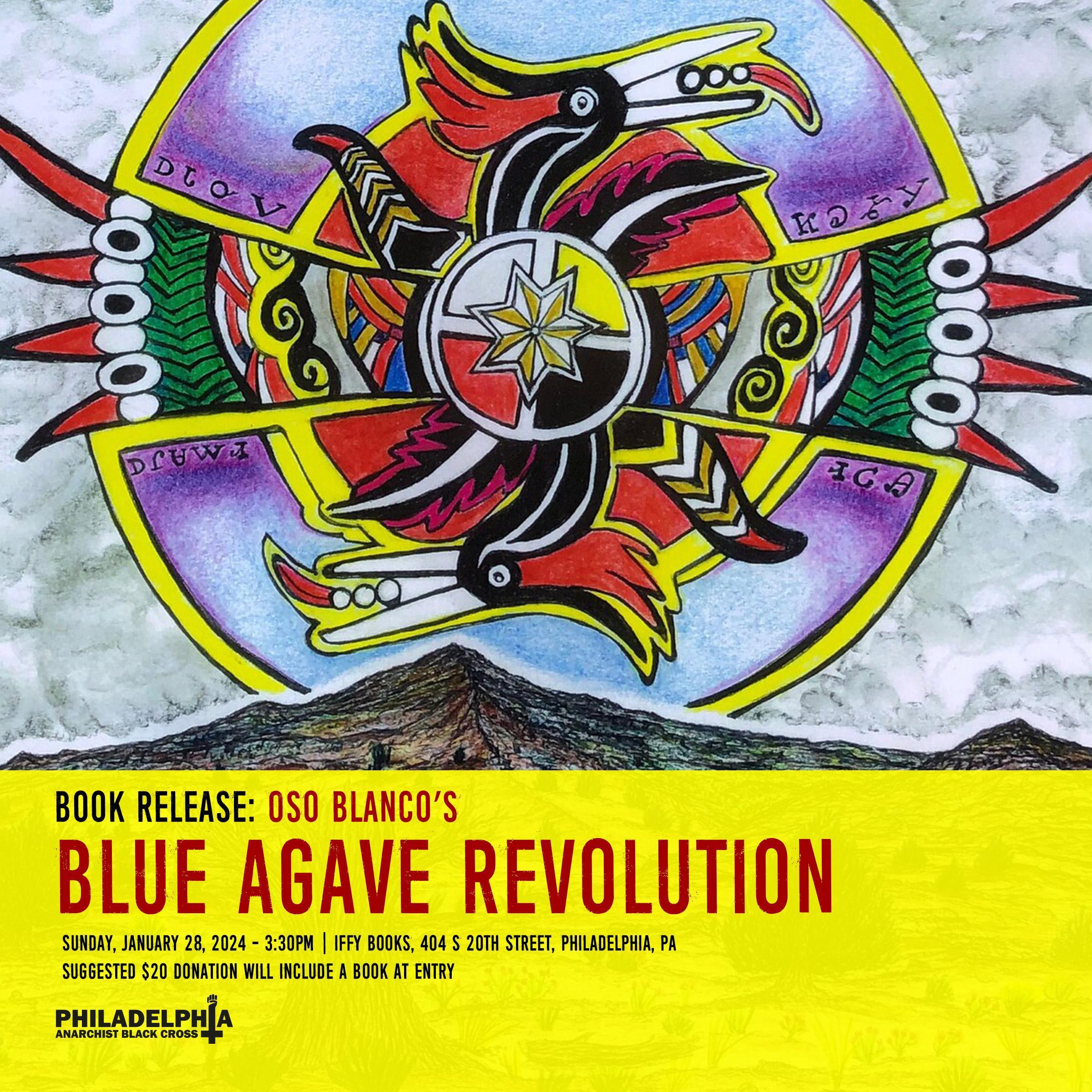
Join us at 3:30pm on Sunday, January 28th at Iffy Books for the premier release of freshly published, The Blue Agave Revolution: Poetry of the Blind Rebel. Collaboratively written by indigenous anarchist political prisoner Oso Blanco and Michael Novick, The Blue Agave Revolution is a joint work of speculative/magical realist fiction containing tales of the Mexican Revolution, analyses of contemporary Indigenous struggle, engagement with the work of other political prisoners including Leonard Peltier, Mumia Abu-Jamal, and Jessica Reznicek, art, poetry, and meditations about what struggles for freedom may look like in the future.
After introducing the book and hearing a piece from Oso Blanco himself, we’ll jump into a multimedia program on contemporary aspects of the Zapatista movement and other topics related to Oso Blanco’s wholehearted connections to indigenous autonomy in Turtle Island. We will be joined by author and journalist Scott Campbell to shed light on the role of Magonismo in the early Mexican revolution.
$20 suggested donation (includes a copy of the book). No one turned away for lack of funds.
Remote participation is welcome! If you can’t make it in person, we’ll ship it to you so you can follow along. We also encourage those who are joining in person, to purchase and familiarize yourself with the book ahead of time, but that is completely up to you. Cash donations at the event are welcome too!
from Unicorn Riot
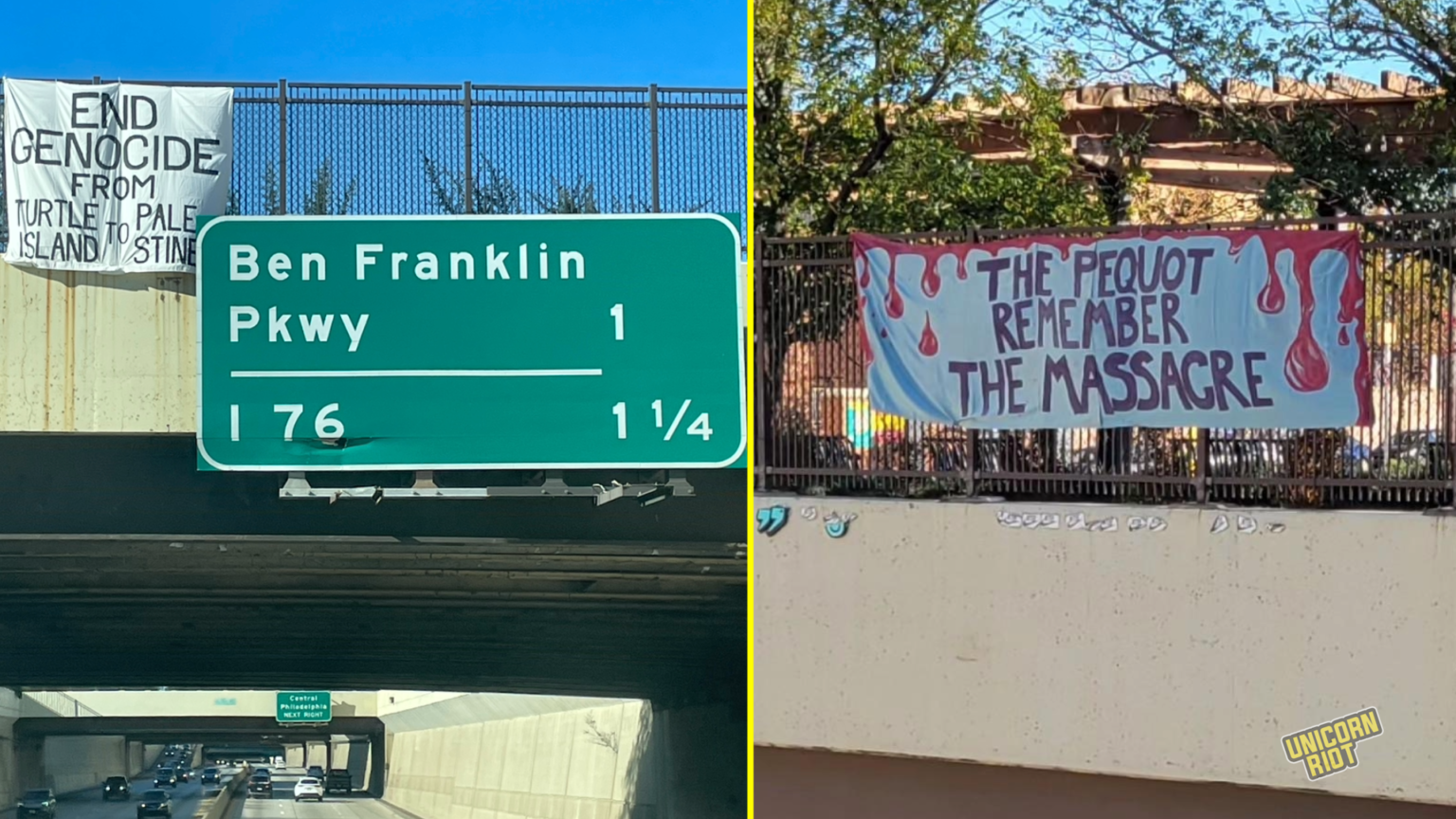
Philadelphia, PA — On November 23, around 11 a.m., Black and Indigenous and anti-Zionist Jewish activists hung banners along Interstate 676, just blocks away from the Thanksgiving Day Parade on occupied Lenapehoking land, otherwise known as Philadelphia. They collaborated to highlight the ongoing injustice and struggles of Indigenous people in the U.S. while also displaying solidarity with those against occupation in Palestine.
Parade floats accompanied by police escorts on all sides sped below the 10th Street overpass just moments before the first banner was hung. It served as a timely punctuation as east bound traffic watched the banner unfurl to read, “The Pequot Remember the Massacre.”
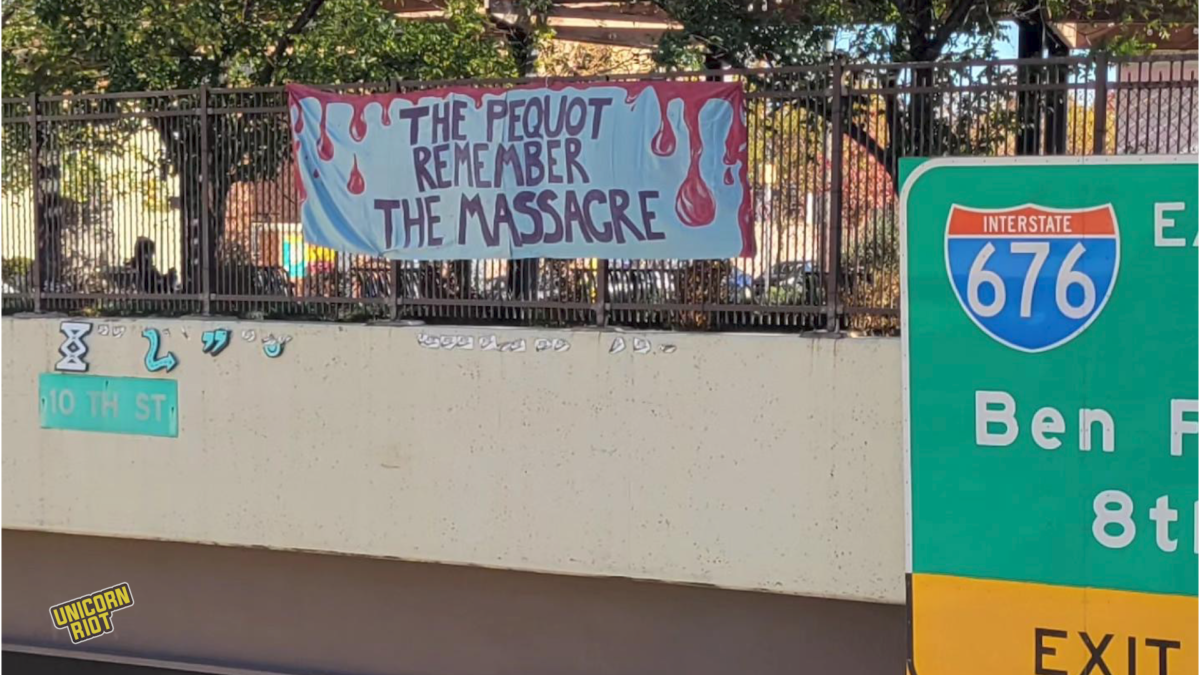
The Pequot Massacre occurred on May 26, 1637. Settler-colonial Puritan soldiers, organized as the Massachusetts Bay Colony Militia, aimed to steal the tribe’s traditional land in a surprise ambush that murdered 700 Pequot adults and children. During the massacre, settlers set fire to the village burning any remaining people alive. Governor John Winthrop declared a celebration of this massacre later that year that some consider to be the first Thanksgiving. The following year, white settlers outlawed the Pequot language and name, seized tribal lands, and forced some surviving Pequot people into slavery. This further galvanized the massacre into a genocide.
The second banner to be dropped from the overpass faced west bound traffic and revealed the words “End Genocide from Turtle Island to Palestine.”

The following day, Black Friday, other autonomous groups got to work hanging banners along this same interstate which runs like a river through the city center. However, on that morning, similar anti-colonial and anti-Zionist messages could now be read throughout this corridor of the city in defiance of erasure.
These banner drops follow acts of nonviolent civil disobedience, direct actions, and marches that have been happening all over Philadelphia on a near-daily basis since Israel began bombing Gaza after October 7.
They also occur within a broader movement framework of autonomous actions across the country that commemorated November 23 as the Indigenous National Day of Mourning — a day that serves to highlight centuries of atrocities committed against Indigenous people and to correct present myths in history texts taught in American schools.
For the last 53 years on the fourth Thursday of November, the Indigenous National Day of Mourning has taken place to “honor Indigenous ancestors and Native resilience. It is a day of remembrance and spiritual connection, as well as a protest against the racism and oppression that Indigenous people continue to experience worldwide.”
Since its first treaty, the U.S. government has continually broken each and every written agreement signed with Indigenous Nations as more white settlers wanted their land. Starting with the Treaty With the Delawares/Treaty of Fort Pitt in 1778 with the Lenni Lenape peoples.
In Pennsylvania in 1782, an American Revolutionary War officer and his militia slaughtered nearly 100 Lenape (mostly women and children) at the village of Gnadenhutten after wrongly believing they were responsible for attacks against white settlers. This led to more settler-colonialists moving onto Lenape territory, before the Treaty of Greeneville in 1795 forced the Lenape and other nearby tribes to surrender most of their lands.
All of this erasure, murder, and forced relocation continued to shrink and control the spaces where Indigenous people could inhabit. Thirty-five years later, in 1830, U.S. Congress passed the Indian Removal Act which codified the violent removal of Indigenous people from their ancestral lands en masse, in what’s known as the Trail of Tears. Today, data shows that Indigenous people in the United States have lost nearly 99% of the land they historically occupied.
Unicorn Riot heard about the aspirations of some of those involved in bringing the anti-colonial and anti-Zionist messaging into Philly’s downtown corporate Thanksgiving space.
UR: Thank you for taking the time to speak with us. Why do you think it’s important for this action to take place on Thanksgiving in the US?
“As an Indigenous activist it’s important to keep reminding people of the brutal history of ongoing displacement and genocide. My heart breaks for people all over the world who are actively displaced for the nation state war machine.
To have traditional food and practices whitewashed and fed back to us as if we should be grateful for the nod to our history while ignoring the part the capitalist U.S. state has played in killing us and our traditional practices is frankly disgusting.”
– K
“Much like we are seeing genocides in Palestine, Congo, Armenia, and Sudan be denied and erased in real time, colonizers have erased the continued and active genocide of Indigenous peoples in the so-called United States. They have taken our feasts and our foods, and have created a celebration from our suffering. They throw parades to commemorate their military victories while our people go hungry on our reservations and in our cities, homeless and in need in our own homelands. But we are here to remind them that we have not forgotten and we will not be silently erased.“
– F
UR: How did you bridge the gap between occupation in the U.S. and occupation in Palestine? What about the Pequot massacre did you want to invoke in this moment?
“To see the defense of Palestine is beautiful, but to condemn one genocide while celebrating another is not justice. Over 700 Pequot women, children, and elders were murdered in a surprise raid while many of their warriors were away. That is the true history of Thanksgiving. That is what is being celebrated today. Regardless of whether you can call it Thanksgiving, Friendsgiving, or your fall feast, if you are not telling the true history & feeling it’s full weight then you are commemorating our genocide. “
– F
UR: What did you want people to take away most from this action?
“I hope that the banners incite conversations that question colonialism here and in Israel. For non-Native people like myself who are gathering with family or friends today, I hope they talk about how to be part of initiating repair and reparations for Indigenous people in the US. Similarly, as an anti-Zionist Jewish person, I hope Jewish families talk about the way our identities and trauma are being manipulated for colonial purposes, and how we can resist that to stand with Palestinians.”
– R
“We should stand against occupation and genocide around the globe, and that begins with the land beneath our feet. We must examine our own role in continued genocide and settler colonialism, and we must take responsibility for ending all States at war with the People, including our own. We are not free until we are all free, and we are not all free until every oppressive force has fallen to the ground. Start where you are, start today, and don’t stop til we free them all.”
– F
from Philly ABC
Leonard was a member of the American Indian Movement active in the 1970s. It is his involvement in supporting rights for indigenous people that set the stage for the accusation that he participated in the killing of FBI agents. It’s unconscionable that he’s been left to rot in a federal penitentiary for nearly half a century after being convicted on false evidence . In 2009, Leonard had his first and only parole hearing. He was given a 25-year hit, an exorbitant length that is rarely, if ever, given. His legal team and many supporters worldwide are now seeking executive clemency for him. Let’s send him some love to fortify his strength and resilience, and lend support for his fight for freedom.
Snacks and letter-writing supplies will be provided. If you cannot make the event, drop Leonard a line at:
Leonard Peltier #89637-132 USP Coleman I P.O. Box 1033 Coleman, FL 33521
We will also send a birthday card to another elder political prisoner born in March: Ruchell Magee (the 17th).
Submission
On the night of November 5th, a small group of Anti-colonial Anarchist settlers in Lenapehoking blockaded a chokepoint of a high frequency railway in Solidarity with the Wet’suwet’en resisting drilling in the Wedzin Kwa and all those resisting colonial capitalist development and infrastructure all across Turtle Island and the World!
It was a very simple and easily replicable action using commonly found blockade materials that were near the tracks already.
We hope to inspire many more and frequent railway blockades as an effective action to disrupt colonial and ecocidal infrastructure all across Turtle Island and Globally.
Shut down Canada, Colonialism, and Capitalism everywhere!
from Making World Books
Faint traces of Indigenous people and their histories abound in American media, memory, and myths. Indigeneity often remains absent or invisible, however, especially in contemporary political and intellectual discourse about white supremacy, anti-Blackness, and racism in general. In this ambitious new book, Kevin Bruyneel confronts the chronic displacement of Indigeneity in the politics and discourse around race in American political theory and culture, arguing that the ongoing influence of settler-colonialism has undermined efforts to understand Indigenous politics while also hindering conversation around race itself.
By reexamining major episodes, texts, writers, and memories of the political past from the seventeenth century to the present, Bruyneel reveals the power of settler memory at work in the persistent disavowal of Indigeneity. He also shows how Indigenous and Black intellectuals have understood ties between racism and white settler memory, even as the settler dimensions of whiteness are frequently erased in our discourse about race, whether in conflicts over Indian mascotry or the white nationalist underpinnings of Trumpism.
Envisioning a new political future, Bruyneel challenges readers to refuse settler memory and consider a third reconstruction that can meaningfully link antiracism and anticolonialism.
After a short lecture, Kevin Bruyneel will be in conversation with Chenjerai Kumanyika and Jaskiran Dhillon.
Advance registration is requested.
[May 7 5:00 PM – 6:30 PM ]
from Philly ABC
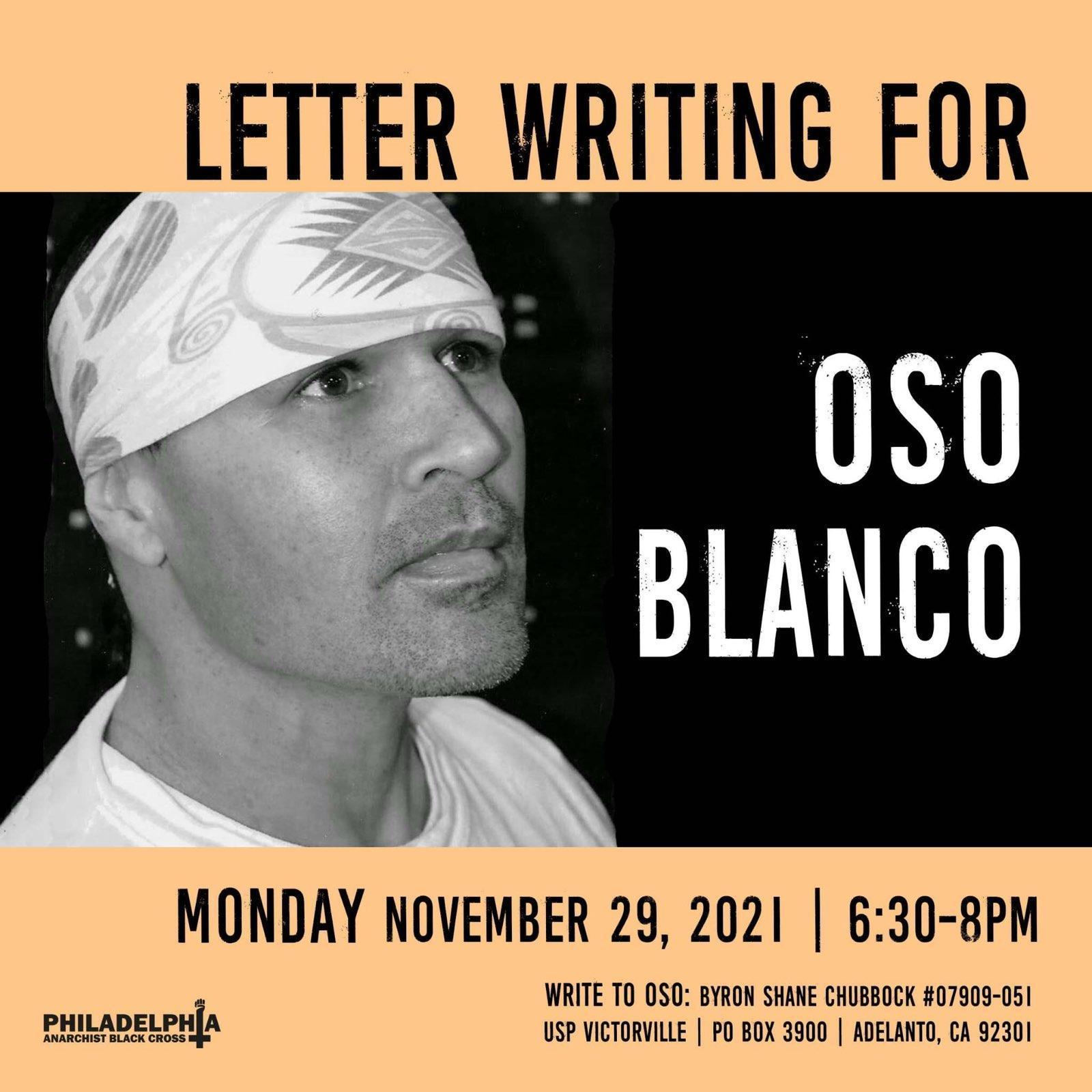
The National Native Day of Mourning (so-called Thanksgiving) marks the invasion, theft of land, and genocide committed against the Indigenous Native People by European colonialists and later by their Amerikan descendants. UFF Ohio 7 comrades, Kazi Toure and Jaan Laaman, will be conducting a 24 hour fast on Nov. 25th and ask you to join:
This fast is to recognize and highlight the genocide of Native People and the theft of Native land. This is NOT just a historical horror – it continues today with all the injustices, abuses and ongoing land and resources theft committed against Native People all across this imperialist – colonialist USA state. In particular we focus on and demand the immediate release of Leonard Peltier – Native Elder, AIM activist, teacher, mentor, sun dancer and our dear friend and brother. Leonard is a political prisoner, in captivity over 44 years! Leonard must be freed – all U.S.-held political prisoners must be freed! Many Native Councils and governments have long called for Leonard’s release. Very recently, 10 US Senators and Representatives have called for President Joe Biden to release Leonard Peltier. We welcome everyone, each one of you, to join Kazi and Jaan in fasting, however long and in whatever way is meaningful for you, on Nov. 25th. Also do all you can, to get Leonard out of captivity NOW– see Leonard’s website for how you can help! FREE LEONARD PELTIER! FREE ALL POLITICAL PRISONERS!
– Jaan Laaman
Philly ABC is hosting an anti-colonialist letter-writing in solidarity with imprisoned indigenous freedom fighter Oso Blanco. Join us Monday, November 29th, 6:30pm online! We’ll be sharing some information on Oso Blanco’s case, as well as updates on several political prisoners. As we write letters, the film ‘Zapatista’ will be streaming since Oso Blanco is being held captive for expropriating funds to support the Zapatistas. We also encourage folks to send birthday greetings to political prisoners with birthdays in December: Fred “Muhammad” Burton (the 15th) and Casey Brezik (the 30th).
from Philly ABC
 Fidencio Aldama Perez is an indigenous Yaqui land defender and political prisoner from the northern Mexican state of Sonora. He was arrested on October 27, 2016, and later sentenced to fifteen years and six months in prison on trumped-up charges related to a death in the community of Loma de Bácum, Sonora. It is believed that he was targeted due to his support for the indigenous community’s opposition to a gas pipeline that was to pass through Yaqui territory.
Fidencio Aldama Perez is an indigenous Yaqui land defender and political prisoner from the northern Mexican state of Sonora. He was arrested on October 27, 2016, and later sentenced to fifteen years and six months in prison on trumped-up charges related to a death in the community of Loma de Bácum, Sonora. It is believed that he was targeted due to his support for the indigenous community’s opposition to a gas pipeline that was to pass through Yaqui territory.
Before his imprisonment, Fidencio loved playing soccer with his children and the community. His favorite team is C.F. Pachuca. He is a talented singer and musician, playing the guitar, bass, accordion, and flute. He has long been involved in practicing, teaching, and strengthening the culture and traditions of the Yaqui people, including playing guitar in traditional Yaqui ceremonies and participating in communal dances. For Fidencio, his identity as indigenous and Yaqui is extremely important, something he has passed on to his children. His vision is for a Yaqui territory that fully belongs to the Yaqui people and from which no one can be displaced.
Please join us this coming Monday in Clark Park (stone platform near 45th and Chester) for letter-writing and art-making in participation of the international week of letter-writing and artwork in solidarity with Fidencio Aldama Perez!
We will also send birthday cards to a political prisoner with a birthday in July: Gage Halupowski (the 1st).